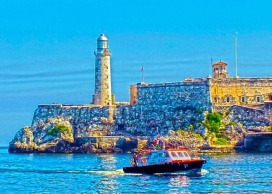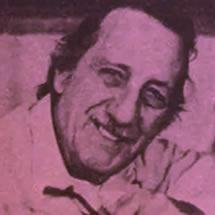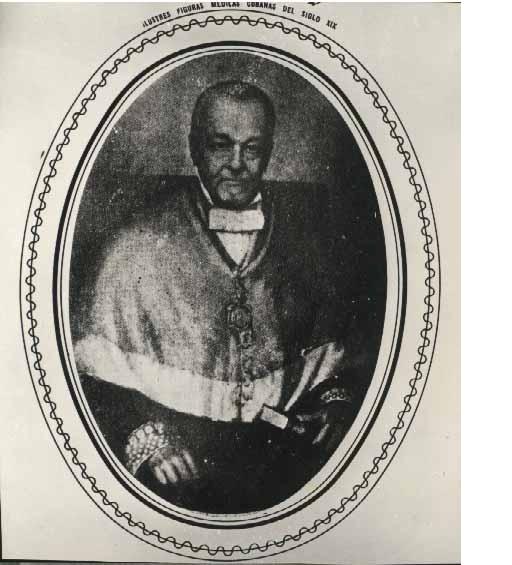
Havana ephemeris. October 2nd.
1797. . Ángel José Cowley Arbirdes is born in Havana.
He began his primary studies at the Belén School. In 1812 he studied Philosophy at the Real Colegio Seminario de San Carlos. Later he continued studying medicine at the Royal and Pontifical University of San Geronimo in Havana. In 1818 he graduated as a Bachelor of Arts and in 1819 he achieved the title of Surgeon.
He began his work at the Royal Military Hospital of San Ambrosio in Havana. In 1824 he became a full member of the Economic Society of Friends of the Country, where he performed various functions.
In addition to being a doctor, he studied chemistry and botany. As for chemistry, he was the first professor who explained Toxicology in Havana.
His death occurred in the Cuban capital on October 5, 1859.
1859. The newspaper El Regañón is founded in Havana.

He spread stories, poetry and articles on Cuban literature and periodicals. Articles of cultural interest and works of literary criticism on Cuban poets appeared in its pages.
It also reflected part of the activities of the Royal Literary University of Havana and the Colegio del Salvador.
In addition, articles on science and arts, caricatures and engravings appeared on its pages every Sunday.
In Cuba there were three publications with a similar name: El Regañón de La Habana in 1800; The Substitute of the Regañón of Havana in 1803 and New Regañón of Havana in 1830.
1914. Juan Ángel Cardi is born in Havana.

From a very young age he evidenced the conditions that he had to venture into the field of humor. As a teenager he edited a manuscript weekly, but could not fully develop his aptitude for humor until after the triumph of the Revolution in Cuba in January 1959.
He began writing scripts for radio and television programs and also collaborated with different publications such as Zig-Zag, El Pitirre, Dedeté, Verde Olivo, Bohemia and the weekly Palante. It was in this last publication where his creative work became more evident since he worked there for more than thirty years and published numerous works in which he evidenced his qualities as a humorist.
He also ventured into police literature, but always expressed that he was at ease when he dealt with materials related to humor. He was the author of several books.
For his meritorious work, he was awarded the "Alfredo López" Order and he also received other awards and recognitions.
1932. Antonio “Ñico” López Fernández is born in La Lisa, Havana.

Coming from a humble family, he was barely able to study to devote himself to work to help support his family. From the age of 15 he joined political life as part of the Orthodox youth. In the early 1950s, he linked up with the Orthodox Cuban People's Party, headed by Eduardo Chibas. When Fulgencio Batista's coup d'état took place in 1952, he began to join the group of young people who followed Fidel Castro's ideas about the need to carry out the revolutionary struggle.
On July 26, 1953, he participated in the assault on the Carlos Manuel de Céspedes barracks in Bayamo. After the attempted surprise occupation of the military installation failed, he was able to escape. He managed to hide in the house of some friends in Havana and after various efforts he was able to leave the country.
On December 2, 1956, he was part of the 82 expeditionaries who traveled on the Granma yacht from the Mexican port of Tuxpán. In the area of Alegría de Pío, the revolutionary combatants were surprised by soldiers of the dictatorship. Days later he was captured and finally killed on December 8, 1956, along with other expedition members in Boca del Toro, a few kilometers from the then central Pilón, in Oriente province.
In recognition of his evolutionary work, the largest refinery in Cuba located in Havana bears his name.
1957. Agustín Rodríguez Castro dies in Havana

His birth took place in the province of Lugo, in Galicia, Spain, on August 29, 1885. He emigrated to Cuba in 1901. After his love for the theater emerged, in 1905 he managed to premiere his first work at the Alhambra Theater in Havana. He was soon captivated by the nascent Cuban theater of zarzuelas and skits, a genre to which he dedicated himself and premiered more than 400 works.
He was an author, theater director and businessman, film scriptwriter, farce and zarzuela librettist and creator of lyrics for songs. One of the most famous and universal was, without a doubt, "Quiéreme Mucho", which achieved great notoriety both in Cuba and internationally. He was also a teacher of outstanding Cuban theater and comedy actors. The themes that he wrote that identified the Cuban people were very varied.
1993. Américo Celestino Del Cioppo dies in Havana

Known as Atahualpa Del Cioppo, he was one of the most prestigious men in the theater of Uruguay. His work transcended geographical borders thanks to his professional work, the ethics and the rigor with which he carried out his work.
He considered that the social function of the theater should be to clarify the historical reality, show the contradictions in society and present the possibility of its transformation in favor of the human condition.
His birth took place on February 23, 1904 in Canelones, Uruguay.
